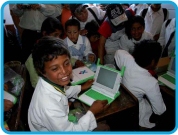Goals
Introduction
PC computers have been the vector of deployment of Internet and Web access for most people and families of the Developed World. However, for a long time, it was not an affordable option for people in the Developing World. In order to tackle this problem, lots of initiatives have focused on starting telecenters. While these telecenters have been extremely successful, they are still very rare in rural areas. Moreover, the impact of computer is far less important when it is a heavily shared resource. Starting from this observation, and with the evolution of the hardware and the revolution of the free and open source software, few initiatives around the World are now investigating how to make very low-cost laptops and other low cost information access devices.
The most known and the one that has created the most buzz is certainly the $100 laptop initiative (OLPC http://www.laptop.org). Recently a lot of buzz has been created around the new Intel initiative “Classmate Laptop”. Similarly initiatives in China, India, Brazil and other countries have been announced for new low cost computing devices.
Aim
This work package will participate to the achievement of the two objectives “Identify actors (stakeholder, initiatives, consumers…) of the mobile, laptop , other information access devices and access domain and engage them in DigitalWorld” and “identify opportunities, challenges and potential actions to tackle them in the mobile, low-cost information access device, access domain”. This work package will explore how the EU could play a proactive and visible role in the area of low-cost laptops and other low cost information access devices, especially where flagship initiatives are currently lead by players from non-EU countries.
While in the mobile domain Europe has a strong leadership, this is not true to the same degree for the laptop domain. Most European laptop manufacturer (Olivetti, Acorn) have given up on producing/designing laptops in Europe. The leading low-cost laptop players are today outside of Europe (US: OLPC – Production in Taiwan with QUANTA), COMPAL in Taiwan/China. Recently, China has entered the race with its low-cost laptop initiative named Longmeng.
It is developed by the Institute of Computing Technology (ICT) under the Chinese Academy of Sciences, and it aims at competing with OLPC in cost and functionalities. Indeed, the Longmeng has a Godson II processor, which is equivalent in processing power to the Pentium III. It is a computer, a DVD player and a video game player, using the Linux operating system. It is the size of a textbook and weighs about half a kilogram. In June 2007, ASUS, a leading manufacturer from Taiwan, presented yet another inexpensive miniature flash-based laptop running Linux: Asus's $190 Eee PC (3ePC) with Windows-like Linux operating system, which boots in 15 seconds from 2GB of flash. The Asus is roughly the same size as Via's NanoBook, also introduced at Computex this June. Additionally, the 3ePC has a 7-inch display and weighs about 1kg. The specifications also match those of the NanoBook. Opportunities and challenges exist in applying these and other information access devices in fostering social and economic development.
Description
In order to achieve these two objectives, the WP2 will:
- Make of state of the art of existing initiatives in the lowcost information access device domain, identifying the actors, the design choices, and the current development state. This SoA will also identify potential EU actors that could take advantage on one of these initiatives
- Organize a community building activity between identified actors to seed exchanges, and identification of the key R&D or standardization actions that could make significant contribution to the domain. This activity will be achieved through the organization of an International Workshop on low-cost information access device technologies.
- Develop a roadmap based on inputs gathered during the above-mentioned community building activity, and validated by actors of the domain which would define the key initiatives to launch and the potential organizations that could be involved in them.
The identified road map will then be widely disseminated to relevant actors during the course of WP4.
Documents
Contacts
The partner in charge of this item is Meraka Institute and the person in charge of this domain is Cleophas Dzinotyiweyi ( CDzinotyiweyi [at] csir.co.za ).
Please do not hesitate to send an email with suggestions, propositions, ideas, comments!

 Low-cost Laptop
Low-cost Laptop Spanish
Spanish English
English

